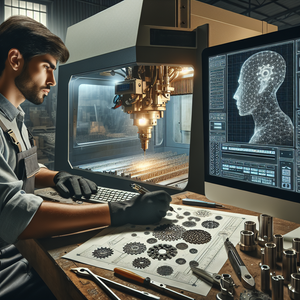
Navigating the World of CNC Programming: Your In-Depth Guide
CNC programming stands at the crossroads of artistry and technical expertise in today’s manufacturing sphere. As industries integrate advanced technologies and the demand for tailored solutions rises, a wealth of career opportunities has become available for proficient CNC professionals. The landscape is diverse, offering everything from freelance gigs to permanent roles, with a broad spectrum of responsibilities and work environments.
Job Summaries:
CNC Programmer:
- CNC Programmers are the architects of machine operation.
- They develop intricate instructions that guide CNC machines in producing top-notch components.
- Their tasks include interpreting engineering blueprints, selecting appropriate tools, and crafting G-code programs.
- Typically, an associate degree or certificate in CNC programming and proficiency in CAD/CAM software are prerequisites.
Freelance CNC Programmer:
- Freelancing in CNC programming offers seasoned professionals the freedom to work independently with various clients.
- Those with at least five years of experience and strong programming skills can thrive in this environment.
- Helping businesses optimize production processes.
Contract CNC Programmer:
- Contract CNC Programmers step in to meet temporary needs within organizations.
- They often bring specialized skills for specific projects.
- They are responsible for writing and adjusting CNC programs.
- They ensure machines operate safely.
CNC Machinist:
- Operating CNC machines to transform raw materials into precise parts is the core of a CNC Machinist's role.
- They follow blueprints, set up machines, and carry out quality checks.
CNC Setup Technician:
- The CNC Setup Technician is responsible for preparing machines for production runs.
- Ensuring tools and programs are correctly configured.
- This role necessitates collaboration with CNC Programmers.
CNC Operator:
- CNC Operators play a crucial role in the manufacturing process
- Running CNC machines per predefined programs
- Monitoring production quality
CAD/CAM Programmer:
- CAD/CAM Programmers utilize design software to streamline the machining process.
- Transform intricate 2D and 3D models into CNC programs.
CNC Tooling Engineer:
- Focused on designing and developing tools for CNC machining
- CNC Tooling Engineers analyze production requirements
- Devise tooling solutions
CNC Maintenance Technician:
- CNC Maintenance Technicians ensure the longevity and reliability of CNC machinery
- Maintaining and repairing equipment
CNC Quality Control Inspector:
- Tasked with upholding quality standards
- CNC Quality Control Inspectors evaluate machined components through thorough inspections.
CNC Application Engineer:
- These engineers collaborate with clients to identify machining requirements.
- Providing customized programming solutions.
CNC Programmer Trainer:
- CNC Programmer Trainers play an essential role in educating new talent on programming techniques and software best practices.
CNC Sales Engineer:
- Combining technical insights with sales acumen
- CNC Sales Engineers promote machinery and programming services.
CNC Programming Consultant:
- Offering specialized expertise
- CNC Programming Consultants work on a project basis
- Enhance programming processes
CNC Research and Development Engineer:
- These engineers innovate within the CNC space.
- Requiring a bachelor’s degree in engineering.
- Experience with CNC technologies.
CNC Software Developer:
- Tasked with creating and maintaining software that supports CNC programming.
- These developers blend software engineering with an understanding of CNC machinery.
CNC Production Manager:
- Overseeing the entire CNC machining process
- Production Managers ensure production goals are met
- Maintaining quality standards
CNC Innovations Specialist:
- These specialists explore emerging technologies to enhance CNC programming processes.
CNC Logistics Coordinator:
- By managing the flow of materials within CNC operations
- Logistics Coordinators ensure production schedules are maintained.
CNC User Experience Designer:
- Focusing on creating user-friendly interfaces for CNC programming software
- These designers improve usability for programmers and operators alike.
The field of CNC programming is vast and varied, with each role contributing uniquely to the manufacturing ecosystem. As the need for skilled professionals continues to rise, aspiring candidates can utilize the insights provided in this guide to align their skills and experiences with available opportunities.
Explore More Jobs

